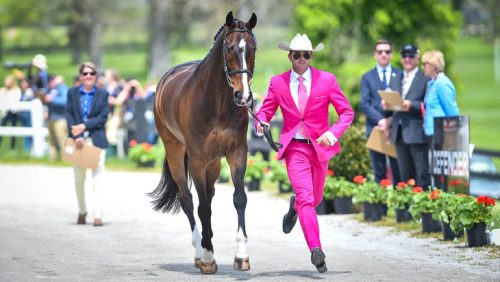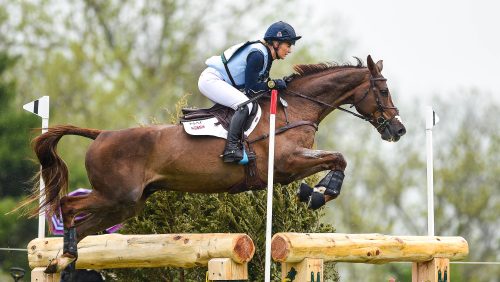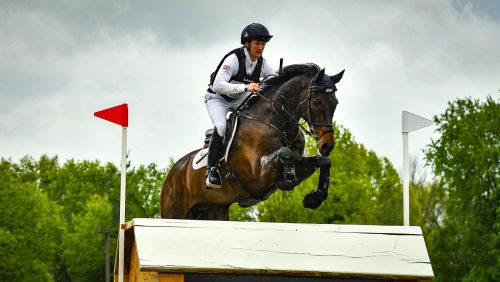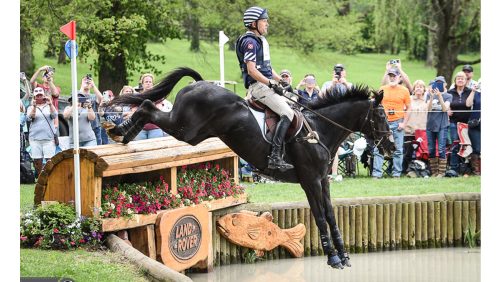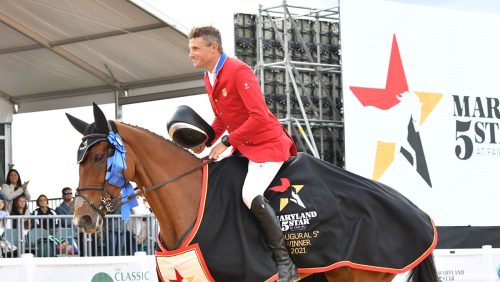Whether they were discussing helmet mandates and concussion suspensions or indulging the “Marmadukes” dancing around in their skulls, eventers from across the country had their heads on their minds at the U.S. Eventing Association’s Annual Meeting and Convention in Scottsdale, Ariz., Dec. 9-12.
British phenom Oliver Townend served as the convention’s keynote speaker at the Westin Kierland Resort And Spa, and he had attendees rolling in the aisles with his dry humor. He told his personal story of rising from a working-class background to become one of Britain’s top eventers by his mid-20s to encourage riders that “If I can do it, anyone can.”
Townend balanced the serious sides of his story—his often-criticized quest for money, reputation for poaching horses from other riders and horsemanship mistakes—with self-effacing humor and modesty.
“Marmaduke” became the tagline of the weekend after he talked about British Eventing sending a counselor to help with his burgeoning drinking problem. The therapist blamed his destructive behavior on “a chimpanzee in the front of his brain”—which Townend and his friends christened Marmaduke—and told him he needed only to “befriend and tame it” to overcome his urges to drink. Unfortunately, however, the first time his counselor asked for an status update, Townend had to admit that he had not, in fact, befriended the chimpanzee.
“I drowned the bastard with 12 pints of lager and wine,” he said, garnering hearty laughs.
The battle is an ongoing one for Townend. And it proved to be a losing one for many other convention attendees, who found their inner Marmadukes in the evening hours throughout the weekend at various parties and cocktail receptions. But come 7:30 a.m. each morning, it was business time.
ADVERTISEMENT
Ruling For The Good
Rule change proposals are generally among the most contentious subjects at each convention, but this year there was nearly unanimous approval of almost everything on the docket.
“A lot of eyes looking at these things and a lot of people thinking about them is infinitely better than me locked up in a room being the only one working on them, and I am so thankful for all of you,” said U.S. Equestrian Federation Eventing Committee chair Malcolm Hook to the standing-room only crowd in the rule change open forum.
Eventers wholeheartedly embraced the proposed mandate that any rider mounted anywhere on competition grounds wear a properly-fitted ASTM/SEI helmet, which means top hats and hunt caps will no longer be allowed in national-level competition.
The eventing community made another proactive move in the name of safety by accepting the proposed concussion suspension rules. If a fallen rider has been determined unconscious or concussed by the competition’s attending medical personnel, they will be issued a mandatory 7- or 21-day suspension from competition, depending on the severity of their injury. If, and only if, the rider has established a cognitive baseline (through certified programs such as ImPACT) and proves that he or she retains that baseline function after the fall, the suspension can be lifted early.
“We’ve borrowed the wording from British Eventing’s rule on this, because it’s worked pretty well there for two years,” Hook said.
ADVERTISEMENT
Other widely accepted proposals included eligibility changes for the horse and rider divisions of competition: to enter these divisions, horses and riders may not have completed events above the next highest level within the previous five years.
The Professional Horsemens’ Council also contributed significant changes to the rider representative proposal, answering questions about the role of these individuals and fleshing out their responsibilities at events.
“The rider representative system as it exists is frequently not well utilized and is sometimes not effective and frequently bypasses a lot of people,” said Hook. “We’ve been talking about this for about six years now with the PHC, and I don’t know that it’s going to be the perfect system, but it’s going to be a step forward in improving communications between riders and officials.”
Tidbits
- At Friday afternoon’s awards luncheon, Janie Atkinson, the retiring organizer of the Rolex Kentucky CCI****, received the President’s Lifetime Service Award for her 36 years of devotion to the nation’s top three-day event. Her course builder, Mick Costello, also won the Posthole Digger Award and earned a standing ovation from the crowd. In addition to Rolex Kentucky, both served in their same capacities at the Alltech FEI World Equestrian Games.
- Area IV’s longtime organizer Katie Lindsay won the Wofford Cup for her outstanding contributions to the sport, in hosting competitions, mentoring riders and commentary on eventing.
- Sarah Kelly accepted the Andrew H. Popiel Memorial Trophy for organizers on behalf of her mother, Rebecca Broussard, who established Rebecca Farm and its top-level events in Kalispell, Mont., and has sponsored multiple riders throughout her lifetime.
- In high performance news, Jan. 31 is the application deadline for the U.S. chef d’equipe position, which Capt. Mark Phillips will vacate after 2012, and no one has applied yet. Advanced riders in Thursday’s active athletes forum also agreed that Red Hills (Fla.) and Rebecca Farm (Mont.) organizers shouldn’t bother fronting the money to host FEI Eventing World Cup Qualifiers in 2011, because the prize money for the series has been cut by more than half, and since North America is only allotted two qualifiers anyway, the chances of any U.S. riders winning were slim.
- Brian Sabo began his new term at USEA president on Sunday morning, taking the mantle from fellow West Coast eventer Kevin Baumgardner. After being formally voted into office, Sabo addressed the membership by recalling the safety crisis the sport endured in 2008, right at the beginning of Baumgardner’s term. “We owe him nothing but a debt of gratitude for keeping this ship straight and level,” Sabo said.
- There’s reason to hope that 2011 will bring a reconsideration of the “one fall, and you’re out” rule in eventing. Conversation on the topic resumed after the USEA Safety and Equine Welfare Committee released the results of their rider fall survey, in which many riders expressed continued frustration with the rule. “I’ve got a lot of data, and I’ll get that together and we’ll start talking about it through 2011,” said Hook. “We’ll start working on the idea of having a serious discussion at the April [Board of Governors] meeting.”
- The USEA boasted a $79,000 operating surplus in 2010.
- The 2011 Annual Meeting and Convention will be held Dec. 7-11 in Nashville, Tenn.
Look for a full report of the 2010 USEA Annual Meeting and Convention in the Dec. 24 issue of The Chronicle of the Horse magazine.







